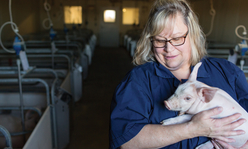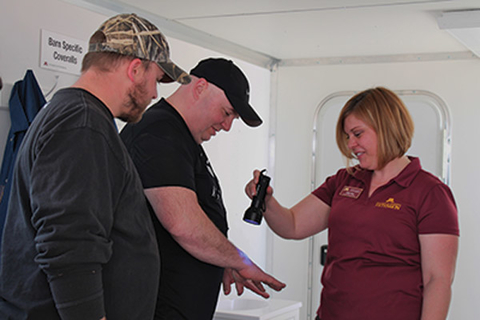BEET trailer
On the BEET for healthy livestock
When diseases hit Minnesota barns, livestock producers suffer. So do meat lovers everywhere, as well as the state’s bottom line. Minnesota is No. 1 in turkey production and third in pork.
Members of the state’s poultry and pork industry rallied to adopt new measures after the 2015 outbreak of avian influenza and 2013 outbreak of porcine epidemic diarrhea virus led to animal losses in the millions. Work to prevent those diseases focused on biosecurity measures used by producers and workers on farms. That work, and the need for it, continues.
Abby Neu, Extension poultry educator, demonstrated biosecurity using Glo Germ inside a trailer used for teaching.
University of Minnesota Extension is hitting the road to teach farmers and farm workers about the proper protocol involved in keeping diseases from spreading. A component of Extension’s mobile effort is the University of Minnesota Biosecure Entry Education Trailer (BEET). BEET was made possible by the state’s Rapid Agricultural Response Fund.
The trailer is used by Extension’s poultry and swine teams, including Sarah Schieck, Extension swine educator, and Abby Neu, Extension poultry educator. They work with producers, state officials, feed haulers and 4-H members to better understand how diseases spread. “It’s everyone’s job in the industry to think about biosecurity,” says Schieck.
Neu says the trailer helps the team explain the principles of Danish Entry, an entry protocol for farms that emphasizes separation between the outside and the inside of the barn housing animals.
Rob Orsten raises turkeys near Willmar. “Biosecurity is probably everything—it’s vital,” he says. “Biosecurity education has to be ongoing and constant.”
A key feature of the trailer is a bench—a line of separation—that focuses attention on the importance of changing out of possibly contaminated clothing and footwear, removing personal items and proper hand washing before stepping into areas where birds live. “Having the bench, this physical barrier, makes people slow down and think about their mental checklist,” says Neu.
“Birds are very susceptible to every little thing that enters the barn,” says Orsten. “The greatest biosecurity program is as weak as a barn worker’s next step.”
Related stories

Pig wellness, assured
176 certified Pork Quality Assurance Plus advisors improved the well-being of over 11 million pigs.


